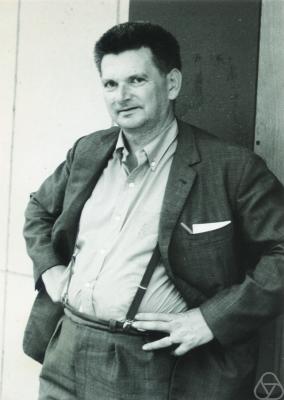René Thom facts for kids
Quick facts for kids
René Thom
|
|
|---|---|

René Thom in Nice, 1970
|
|
| Born | 2 September 1923 Montbéliard, France
|
| Died | 25 October 2002 (aged 79) Bures-sur-Yvette, France
|
| Nationality | French |
| Alma mater | École Normale Supérieure, University of Paris |
| Known for | Catastrophe theory Cobordism Gradient conjecture Quasi-fibration Splitting lemma Thom conjecture Thom isomorphism Thom space Thom transversality theorem Thom's first isotopy lemma Thom–Porteous formula Thom–Sebastiani Theorem Dold–Thom theorem |
| Children | Françoise Thom |
| Awards | Fields Medal (1958) Brouwer Medal (1970) John von Neumann Lecture Prize (1976) |
| Scientific career | |
| Fields | Mathematics |
| Institutions | University of Strasbourg Université Joseph Fourier Institut des Hautes Études Scientifiques |
| Thesis | Espaces fibrés en sphères et carrés de Steenrod (1951) |
| Doctoral advisor | Henri Cartan |
| Doctoral students | David Trotman |
| Influenced | Vladimir Arnold |
René Frédéric Thom (born September 2, 1923 – died October 25, 2002) was a famous French mathematician. He won the important Fields Medal in 1958.
He became well-known for his work in a field called topology. Later, he studied something called singularity theory. He became very famous for one part of this work: creating catastrophe theory. Another mathematician, Christopher Zeeman, helped develop this theory further.
Contents
René Thom's Early Life and Education
René Thom grew up in a simple family in Montbéliard, France. He finished high school in 1940. When Germany invaded France in 1940, his family found safety in Switzerland and then in Lyon.
In 1941, he moved to Paris to study at Lycée Saint-Louis. In 1943, he started studying mathematics at École Normale Supérieure. He earned a special teaching qualification called agrégé in 1946.
His University Studies
René Thom earned his PhD in 1951 from the University of Paris. His main project, called a thesis, was about "Sphere bundles and Steenrod squares." His teacher, Henri Cartan, guided him through this work.
After his PhD, he spent a year at Princeton University in the United States. Then, he became a lecturer at the Universities of Grenoble and University of Strasbourg. He became a full professor in 1957. In 1964, he moved to the Institut des Hautes Études Scientifiques, where he worked until 1990.
Awards and Recognition
In 1958, René Thom received the Fields Medal. This is one of the highest honors a mathematician can get. He earned it for his important work on cobordism theory, which was part of his PhD studies.
He was also invited to speak at the International Congress of Mathematicians two more times. In 1970, he received the Brouwer Medal. He also won the Grand Prix Scientifique de la Ville de Paris in 1974. In 1976, he received the John von Neumann Lecture Prize.
In 1973, he helped start the Fondation Louis-de-Broglie. He was elected a member of the Académie des Sciences of Paris in 1976. The famous artist Salvador Dalí even made paintings inspired by René Thom's ideas.
René Thom's Mathematical Discoveries
While many people know René Thom for catastrophe theory, his biggest achievements were in a math area called topology. He developed catastrophe theory between 1968 and 1972.
Key Ideas in Topology
In the early 1950s, Thom worked on ideas like Thom spaces and cobordism theory. He also developed the Thom transversality theorem. Another idea he worked on was the Thom conjecture.
From the mid-1950s, he started studying singularity theory. Catastrophe theory is just one part of this bigger field. He wrote many important papers about "stratified sets" and "stratified maps." These ideas help us understand how shapes and spaces can change.
Understanding Stable Mappings
Thom's work helped mathematicians understand "topologically stable maps." These are like maps that don't change their basic shape even with small adjustments. His ideas were further developed by John Mather.
In his later years, Thom focused on philosophy and how his math ideas could explain thinking and language.
See also
 In Spanish: René Thom para niños
In Spanish: René Thom para niños
- Reeb graph
 | May Edward Chinn |
 | Rebecca Cole |
 | Alexa Canady |
 | Dorothy Lavinia Brown |

